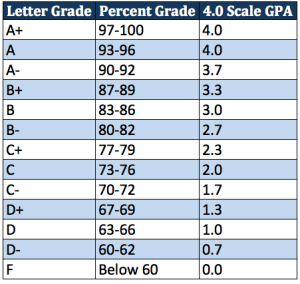Society tells you it only makes sense to go to college. I disagree and argue there are 15 legitimate alternatives to college you should seriously consider.
See the contradiction? A guy who went to college and is the author of How To College tells high school seniors to reconsider automatically going to college.
My main concern is with people who go to college “just because” and don’t have a specific reason behind their decision.
Maybe all of their friends are going, their parents expect that, or society’s beaten them down with the pro-college message that doing anything else seems crazy.
What pisses me off is many times people don’t need college to accomplish their life goals—studies show that around 25% of college grads work at jobs that don’t require a degree—but they sign a four to six year contract because they think they have to and wind up with a mountain of debt.
That’s so messed up!
I’m convinced millions of people would be better off if they followed their passion from the start and never went to college.
So I believe you have to be clear and intentional about why you’re going to college. And if you can’t come up with that, don’t go and instead do something else productive.
Plus the true cost of college is much higher than you think. Let me explain.
[activecampaign form=3]
The True Cost Of College
Opportunity cost refers to the fact that when you make a decision to take one action you miss a benefit of another action.
In this case, going to college means you miss out on the opportunity to work full-time.
So if you’re total cost of college after tuition, living costs, and books is approximately $40,000 a year, that’s not the true cost of college. If you could have made $25,000 a year working full-time (a low income for many of the non-degree jobs listed below), then your true cost is $65,000.
Got it?
And since the average student spends six years in college—according to Complete College America and the Department of Education—not four, this makes the true cost of college $390,000.
Doesn’t look very good on paper right? That’s because college is plain and simple not a good deal. It’s overpriced and they’ve raised tuition too high.
It makes me sick that some 18 year olds are signing up for college solely on the fact that the media and society say it’s smart, then are stuck paying off debt until they’re 30.
I want to help people see the light that not everyone needs college and they can avoid this depressing plunge into debt.
Take a look at these very enticing alternatives to college.
15 Legitimate Alternatives To College
1. Work a job

Contrary to popular opinion, you can work right away with a high school degree.
All of the following occupations don’t require a college degree and some of them pay extremely well:
- Commercial pilot
- Insurance sales rep
- Medical assistant or secretary
- Criminal detective
- Physical trainer
- Loan officer
- Massage therapist
- Graphic designer
- Web developer
- Computer coder
- Optician
- Casino gaming manager
- Power plant operator
- Transportation inspector
- Personal care aide
- Subway and streetcar operator
- Farmer or rancher
Obviously you need the skills for jobs like graphic designer and web developer, for example. But this list goes to show that a college degree doesn’t get in your way for most jobs.
And while your peers are paying to learn in college, you’re getting paid to learn on the job. Looks clear to me that you’re winning that deal.
2. Pursue a creative talent
Fancy yourself acting in the big screen, singing on stage, or killing jokes on a set? The time is now to go for it and skip college.
Because the fact of the matter is that it’s easier to support yourself on this pursuit than while providing for a family later on in life.
So give it all you got to become a professional actor, singer, dancer, comedian, or artist in this window of opportunity.
Spend a year auditioning for as many roles as you can and start small to build your skills.
Hustle your butt off for 18 hours a day. Split a studio with five friends. Fight tooth and nail to make your dream become real.
If it’s needed, move to a place like Los Angeles, Austin, or New York.
College won’t help you nearly as much as you can help yourself in these creative fields.
3. Go to trade school
A trade school education can lead to work in painting, woodwork, locksmithing, landscaping, masonry, locksmith, forestry, construction, welding, and other handyman work.
It’s not sexy, but learning a “blue collar” job through a trade school makes a lot of sense when you look at the numbers.
For example, graduates of trade school make $42,000 on average compared to the $48,000 average salary of college graduates.
But when you consider trade school costs significantly less and it generally takes just two years (meaning two more years to make money), the value is through the roof!
If you’re not already convinced this is a bright option, a Rutgers University study found these trade schools at close to 100% job placements. That’s nothing but impressive.
For many of you reading, you can get a fast start to a successful career through trade school.
4. Start a business
So you want to run your own business someday after majoring in business and then working in a Fortune 500 company? Stop there and hold that thought.
Would you be more experienced and business savvy through hearing lectures or by running your own business? The answer is obvious—lessons are best learned through doing.
I’m also convinced that being an entrepreneur offers these very real benefits. Running your own shop will force you to learn to:
- Develop your critical thinking skills
- Master time management
- Overcome objections and make the sale
- Treat customers with the utmost respect and politeness
- Communicate with adults and more diverse people than your friends
- Strengthen your creative muscle through new business and marketing ideas
- Network with other entrepreneurs
- Fail fast and bounce back
Plus thanks to the Internet, it’s never been easier to start a business. Spend $50 to $100 and you’ll have your website up and running.
Then the simple formula to online business success is to find a problem you’re passionate about, solve that problem, and then sell the solution. If the problem affects enough people and is a big enough pain, and your solution is good enough, then you’re in business.
So start small and you will have a chance at starting a thriving business. Don’t try to create the next Facebook, you won’t be able to do it.
And don’t be surprised if your business is profitable or it leads you to a new profitable idea. After all, the guy who sold pet rocks became an online millionaire.
5. Take free online classes

Want an Ivy League education without forking up $200,000 to pay for it? Free online courses are the solution for you.
Online learning sites like Coursera, Harvard Extension, edX, and others have made it cost-free and simple to get your learning on. All you have to do is sign up and you’re getting a world-class education in whatever subject you desire.
This way you’re getting a feel for what subjects you’re passionate about before wasting time paying for college and switching your major four times in your freshman year.
Many 18 year olds could use this extra time before jumping into college. It’s a shame more don’t.
Or you can forgo college altogether by using the knowledge and skills you learned from these classes.
You can use what you learned to pursue another alternative on this list.
If you’re interested, check out this guide to learn how to study at Yale, Harvard, and other top institutions, for free!
6.Travel the world
You could sit in a stuffy building to learn about South American history, or you could forego college and visit Machu Picchu, Rio de Janeiro, and Buenos Aires.
Seriously just consider what would happen if you traveled the world for one year.
You’ll learn people skills by meeting other travelers and interacting with locals.
You’ll be tested in your travels to navigate the language barrier and unknown living situation.
Most importantly, being outside your comfort zone traveling will help you build self awareness to discover what areas of life are you passionate about and want to explore further.
And you also avoid any future regret for not going. As time flies and you would normally transition through college, a job, and then kids, you may never get the chance to travel the world for an entire year again.
I recommend you do it now while you’re young (wild) and free.
Now if you’re worried about costs, that’s smart to be money conscious but it’s also not a valid excuse.
Because traveling a year is much cheaper than one year of college. And you can work side jobs while you’re traveling—like teach English, bartend, freelance, sell stuff online, and much more.
7. Join the military
Another possible route is to skip college and join the military.
Serving your country is not only a tremendous honor, there’s also a bunch of tangible benefits including:
- A $35,000 salary with increasing pay the longer you’re in service
- Receive diverse training that’s transferable to your future career
- Have your college paid for (not guaranteed)
- Free health care and almost free living costs
- Free travel across the United States and overseas
I know a few people who joined the military out of high school and they all love the discipline and organization it gives them.
Of course there are some downsides to joining the military.
You’re not in control of where you’re deployed. You could be placed in a war zone at any time, depending on global events outside of your control. And although it’s rare, there is the risk of death which you avoid in college and these other alternatives.
8. Become a realtor
Whether you find yourself browsing home prices on Zillow for fun or dreaming about making six figures, another solid replacement to college is becoming a realtor.
As long as people continue needing a place to live, realtors who are good at their job will have money to bring home.
According to PayScale, the average real estate agent makes approximately $51,000—again, no degree needed.
But what I personally love about the realtor profession is your income has no ceiling. The more you hustle to buy or sell houses, the more you make.
That’s true meritocracy!
And the process to be official is simple: Take real estate courses (“tuition” costs less than $1,000—much more favorable than college), pass the state licensing test, and then start helping people buy and sell homes.
P.S. Read how to use Facebook ads for real estate agents if you plan on becoming one.
9. Volunteer
Many volunteer and charity organizations would happily have you join their team to serve with them, no college degree needed.
What’s ironic is some people graduate college to become a social worker or serve in the Peace Corps when they could have started volunteering right away.
If volunteering is your passion, you’re welcome for that four year head start.
Organizations like AmeriCorps, the Catholic Volunteer Network, and the Peace Corps is where I would look first. And a simple Google search of what and where you want to volunteer will give you enough information to start applying.
When you’re drawn toward serving others, you’ll get more out of volunteering than studying subjects you don’t care about in a college classroom. Plus, learning empathy and the value of giving back will serve you the rest of your life.
And Jesus and Mother Theresa didn’t go to college did they? The way they loved people will never be forgotten.
Again, you can always volunteer for a year or more and then go to college if you really think that’ll help your future. Why rush into it when it’s not needed to do what you love?
10. Build an audience with content

This is what I’m working on every single day: Publishing content with the goal of building an audience and providing value to them.
I so wish I started this at age 18 instead of age 21, but it is what it is.
So how is this accomplished? There are only three options to publish content and build an audience:
- Start a blog if you enjoy and are best at writing
- Start a podcast if you prefer talking
- Start a YouTube channel if you like being in front of the camera
Those are the three tried and true methods that won’t go away. My recommendation is to start with one of those and then add another or all three mediums once you’re more established.
Thousands of people are making a fortune doing this already. So the path to success is there if you know how to build a community around you.
Honestly, it’d be wise to publish content whether you don’t or do go to college. Having a personal brand and following you can take with you always gives you leverage in the future.
That leverage can be deployed to build your own business or to win interviews and job offers.
11. Go to community college
If you’re still stubborn and think you need some kind of college degree before you’re qualified to work, have you considered an associate’s degree instead of a bachelor’s?
An associate’s degree requires half the time, much less than half the money, and opens doors to some high-quality jobs including:
- Radiation therapist
- Dental hygienist
- Registered nurse
- Air traffic controller
- Computer programmer
- Paralegal
- Police officer
- Aerospace engineer
Many of these median salaries are in the high five figures and sometimes six figures—like air traffic controller.
Plus community colleges have some unique benefits like smaller class sizes, more of the professor’s attention, more flexible schedules, and the ability to work while you’re in school.
For example, you’d struggle to get to know your professor if you’re at four-year state school with 250 people in every class.
12. Get a fellowship or apprenticeship
A fellowship or apprenticeship is so appealing to me (if I were 18 again) because they’re hands on jobs where you’re constantly learning through doing, not by hearing lectures and memorizing.
That’s why some fellowships and apprenticeships are taking form and becoming trendy again.
For example, Year On offers a 32 week program that includes a voyage, launch, and internship phase. It’s purpose is to help students learn outside of the classroom through experimentation and mentoring.
And one billionaire, Peter Thiel, questions college to the point where he gives around 20 young adults under age 20 a $100,000 fellowship award not to go to college. Isn’t that interesting?
On the website is the statement, “The Thiel Fellowship gives $100,000 to young people who want to build new things instead of sitting in a classroom.”
If you’re interested in learning more or applying for The Thiel Fellowship, click here.
Some other well-known fellowships include Echoing Green, TechStars, Praxis and The Year In Industry.
There are also other interesting fellowships and apprenticeships that are a Google click away. If you’re diligent in searching you can find solid options.
13. Create a non-profit
Want a rewarding and life-changing experience like nothing else can offer? Look no farther than starting a non-profit.
Just like starting a business, I recommend your non-profit’s mission starts small by addressing a local need in your community.
Because you’d struggle to make a difference if you tried to take on world hunger or something as complex as cancer.
For example of decent ideas, maybe your mission is to financial support animal shelters in your town. Maybe it’s to clothe homeless people in your city. Maybe it’s to provide a free summer camp for underprivileged children.
Recruit some people who might be on board and then test the idea in the community. Talk to people or start serving and evaluate the response. Then continue to improve your service and build your team.
If this is your life’s passion, stick with it or take what you learned to found a new non-profit.
And if you do go to college, your resume will be truly rocking doing this—especially if it makes a tangible difference in the community.
For inspiration, here’s an example of an 18-year-old who started a crazy successful non-profit.
14. Write a book
I truly believe every single person on this Earth has a unique story and some important message to share with the world. Sue me for seeing the positives in humanity.
And that means you’re fully capable of writing a book before you turn 20.
What are you passionate about? What do you excel in?
And most importantly, what’s something you know a lot about and it’s popular enough for other people to care? That’s the special ingredient to writing a quality book.
I get it if you want to wait to write your book until you have something more powerful to say or a little more experience under your belt.
But just know there are some young teenagers writing books for people their age and making a killing, specifically 14-year-old Caleb Maddix comes to mind.
15. Coach a team

Are you a former football, tennis, soccer, basketball, baseball, swimming, or golf player? Have you ever been decent at a sport?
That’s about all the qualifications you need to coach a middle school, junior high, or high school team.
For example, some of my friends have gone on to coach club volleyball teams, high school football teams, 8th grade basketball teams, and everything in between.
High schools will automatically pay you in most cases.
And since many parents want no part of coaching, you can offer the local school or parish to coach the middle school team as long as you’re paid a reasonable fee for your time. You just might have to get more creative to get paid when you coach younger ages.
If you’re a sports enthusiast, you’re going to have a lot of fun coaching. It’s a way to stay close to the game you love after your time to play has ended.
Plus you get the rewarding feeling of passing down the knowledge you’ve learned and making your former coaches proud.
College Isn’t For Everyone
You have to admit after reading this that college isn’t for everyone.
I mean why would a guy or girl who wants to be a realtor, for example, spend at least four years and at least $50,000 a year at college to delay doing what they love?
It doesn’t make sense and college would only disappoint them with a mountain of debt.
Now the table tilts differently in two situations: your parents are paying for your entire education or you’re 100% certain you need to college to get your dream job (investment banker, lawyer, doctor, professor, etc.).
It’s the debt that really pisses me off so if your parents are well off and can easily take the bill then that’s a different story.
But still, thinking this decision through will get you in the habit of questioning the norm and making the best decision for you, not doing things because other people are doing it.
That will help you win down the road in life.
Always aim to live with intention—especially if you’re deciding about a four to six year college contract.
So is college right for you? Only you can answer that.
And before you decide… promise me you will consider all of the options before you blindly go to college.
P.S. If you want help exploring your future options and becoming the best version of yourself, go here.
[activecampaign form=3]



I think that if the answer to why you are doing anything is “I don’t know,” “everyone else is doing it,” “it’s what I’m supposed to do” then it’s probably a good idea to wait and reassess what you think you are going to get out of it.
I absolutely agree that not everyone needs to go to college, or they don’t need to go straight out of high school-especially if they have no idea what they want to do as a job/career! There’s no point in spending that money if there isn’t a good plan.
I disagree a lot with your opportunity cost assessment, though. Unfortunately, many decent (meaning, above minimum wage) paying jobs require a college degree even if the job itself doesn’t require skills normally learned in college. An annual salary of minimum wage comes to $15,080. Some jobs on your list may not require a college degree, but they do require training and certification to the tune of thousands. Take pilots-just getting the certification isn’t enough to get a job at a major airline making a good wage. First you have to get enough experience and that means lower tiered airlines and barely making above minimum wage.
You do a really good job of getting the conversation about the necessity of college going! So many people go just because it’s the next life “step” but as you pointed out there are many alternatives. College will always be there-but if you’re not jazzed about it then it’s in your financial interest to explore other alternatives first.
Thanks Jax, you had some thought-provoking comments and questions.
And to counter your comments on the opportunity cost assessment, which I partly agree with you, I’d say that many of these jobs are stepping stones to better jobs—just as people advance in their career with a college degree, they can and will advance in their careers without one too.
For example, a commercial pilot networks or randomly meets a wealthy person and becomes their private pilot to make double the salary or more.